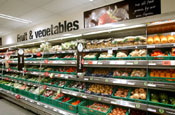Take-home grocery sales rose by 7.4 per cent in the 12 weeks to 21 March, a significant slowdown compared to previous months.
New research from Kantar show that sales over the most recent four-week period were down by 3 per cent compared to this time last year.
“The anniversary of the first national lockdown means we begin to compare grocery sales against the record-breaking levels seen in the early days of the pandemic and growth has, perhaps not surprisingly, dipped over the past four weeks as a result,” said Fraser McKevitt, head of retail and consumer insight (UK), Kantar. “This time last year, Brits were adjusting to schools and offices closing and making extra trips to the supermarket to fill their cupboards for lockdown.”
He said that shoppers made 117 million fewer trips to the supermarket this month compared to the same period in 2020.
But grocery spend still remains much higher than pre-pandemic levels. In fact, sales were up 15.6 per cent compared to the same 12 weeks in 2019, with the average household spending an extra £134 on take-home groceries compared with this period two years ago.
Online grocery growth has also slowed down in the past month, but sales were still 89 per cent higher than this time last year.
Online share of the market dropped back to 14.5 per cent compared to the record 15.4 percent in February 2021.
The research found that overall households made 13 million additional trips to the supermarket in March.
Kantar’s study found that there is growing confidence among older shoppers in particular, with 143,000 fewer over-65s making digital orders in March.
Now largely vaccinated, this age group increased its trips to instore supermarkets by 6.8 per cent – over double the national rate.
UK grocery sales by supermarket
Tesco increased its sales by 8.5 per cent, boosting its market share to 27.1 per cent, up by 0.3 per cent compared to the same three month period last year.
Asda saw its market share grow from 15 per cent to 15.1 per cent.
Morrisons’ sales growth of 8.7 per resulted in an increase of 0.1 percent to 10.1 per cent market share, while sales at Sainsbury’s rose by 7.3 per cent to hold share steady at 15.3 per cent.
Ocado’s sales jumped by 33.9 per cent, bringing market share up to 1.9 per cent from 1.5 per cent a year ago.
Budget supermarkets Lidl and Aldi, grew by 2.9 per cent and 1.5 per cent respectively.
Co-op saw sales rise by 7.1 per cent, while Iceland’s sales increased by 14.3 per cent.
Waitrose sales jumped by 5.1 per cent.
Latest News
-
Morrisons sets 2050 net-zero goal across entire value chain
-
Shoppers spurned credit cards in 2024 due to high interest rates, finds BRC
-
Build-A-Bear partners with Uber Direct for same-day deliveries
-
Primark taps Aldi UK for its new digital transformation director
-
Waitrose to roll out electronic shelf labels across all stores
-
John Lewis to open 3 in-store hospitality spaces
Beyond Channels: Redefining retail with Unified Commerce
This Retail Systems fireside chat with Nikki Baird, Vice President, Strategy & Product at Aptos will explore how unified commerce strategies enable retailers to tear down these barriers and unlock new levels of operational agility and customer satisfaction.
The future of self-checkout: Building a system that works for consumers and retailers
In this webinar, industry leaders discussed what the future of self-checkout looks like and how retailers can make the technology work for everyone.
© 2024 Perspective Publishing Privacy & Cookies












Recent Stories